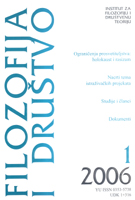Kritička teorija i holokaust
Critical Theory and Holocaust
Author(s): Predrag KrstićSubject(s): Philosophy
Published by: Institut za filozofiju i društvenu teoriju
Keywords: critical theory; Auschwitz; holocaust; jews; theology; the philosophy of history; the culture critique; progress; enlightenment; identity; emancipation;
Summary/Abstract: In this paper the author is attempting to establish the relationship – or the lack of it – of the Critical Theory to the ''Jewish question'' and justification of perceiving signs of Jewish religious heritage in the thought of the representatives of this movement. The holocaust marked out by the name of ''Auschwitz», is here tested as a point where the nature of this relationship has been decided. In this encounter with the cardinal challenge for the contemporary social theory, the particularity of the Frankfurt School reaction is here revealed through Adorno installing Auschwitz as unexpected but lawful emblem of the ending of the course that modern history has assumed. The critique of this ''fascination'' with Auschwitz, as well as certain theoretical pacification and measured positioning of the holocaust into discontinued plane of ''unfinished'' and continuation and closure of the valued project, are given through communicative-theoretical pre-orientation of Jürgen Habermas's Critical Theory and of his followers. Finally, through the work of Detlev Claussen, it is suggested that in the youngest generation of Adorno's students there are signs of revision to once already revised Critical Theory and a kind of defractured and differentiated return to the initial understanding of the decisiveness of the holocaust experience. This shift in the attitude of the Critical Theory thinkers to the provocation of holocaust is not, however, particularly reflected towards the status of Jews and their tradition, but more to the age old questioning and explanatory patterns for which they served as a ''model''. The question of validity of the enlightenment project, the nature of occidental rationalism, (non)existence of historical theology and understanding of the identity and emacipation – describe the circle of problems around which the disagreement is concentrated in the social critical theory.
Journal: Filozofija i društvo
- Issue Year: 2006
- Issue No: 29
- Page Range: 37-77
- Page Count: 37
- Language: Serbian

